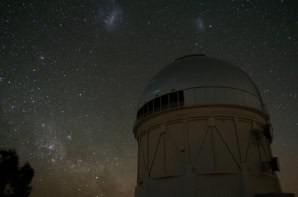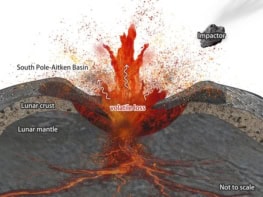
“Nothing” is a tricky concept. Consider Descartes’ peculiar argument against the possibility of a vacuum: “If someone asks what would happen if God were to take away every single body contained in a vessel, without allowing any other body to take the place of what had been removed, the answer must be that the sides of the vessel would, in that case, have to be in contact. For when there is nothing between two bodies, they must necessarily touch each other.” Descartes, like many others, has confused the concept of a vacuum with that of nothing: a vacuum is empty space, but the empty space in the bell jar is still something. It has properties such as size and shape even if it fails to contain matter.
The distinction between a vacuum and nothing plays a central role in both Jim Holt’s Why Does the World Exist? An Existential Detective Story and Lawrence Krauss’s A Universe From Nothing: Why There is Something Rather than Nothing. By their titles, one might expect Krauss’s book to answer Holt’s question. But both authors tend to run together two distinct questions. One – Holt’s main quarry – is “Why is there something rather than nothing?” In Krauss’s book, the question that predominates is “How can something come from nothing?”
The predilection to regard these two questions as equivalent is puzzling, for no-one would confuse the question “Why is the universe matter rather than antimatter?” with the question “How can matter come from antimatter?”. The fact that “nothing” means different things in the two questions makes the muddle more severe. The nothing in Holt’s question is a state of universal and total absence: no matter, no fields, no laws, no space, no time, ever. The nothing in Krauss’s question is a different beast: for most of his book, “nothing” means a vacuum state in some physical theory.
Holt is a journalist with a background in philosophy, and his question is philosophical, so he consults philosophers. Adolf Grünbaum argues that there is no problem: the felt need for an explanation arises from an unjustifiable conviction that nothingness is somehow more probable or expectable than the existence of something. Absent any principle for preferring nothing over something, no explanation is required. Holt finds no flaw in Grünbaum’s argument, but it still does not feel right to him, so he presses on with other philosophers, physicists, theologians and even the novelist John Updike. It makes for an amusing and stimulating, if somewhat picaresque, tale; one recurring motif is that Holt imbibes significant quantities of alcohol while his interlocutors prefer caffeinated beverages.
Holt’s other interviewees include the theologian Richard Swinburne, who opines that the physical world exists because God made it and punts on the question of why God exists. Philosopher Derek Parfit focuses on the form that an explanation might take, considering how some property of the universe might account for its existence. Parfit calls such a property a “selector”. For the speculative cosmologist John Leslie, the selector is goodness: Leslie suggests that the universe exists because it is good, and hence ought to exist. One might also imagine other properties playing the explanatory role, such as simplicity or variety, but Parfit’s idea is that if there is a selector, we can get evidence for what it is by seeing which property (if any) the universe maximally exemplifies. This idea leads Holt, by a somewhat convoluted argument, to suggest that the relevant property might be mediocrity.
The physicists that Holt consults tend to be more on Grünbaum’s side. Steven Weinberg and David Deutsch both recognize the hopelessness of the explanatory regress: anything one invokes to explain the totality of existence must itself be something that exists. One can react to this by saying that we are always stuck with a mystery – or, as Grünbaum would prefer, by saying that there is nothing mysterious since no answerable question is left unanswered.
In his book, Krauss approaches the subject of nothingness as a cosmologist, and his question offers rather more for physicists to investigate. Suppose there is a certain physical state, not of the whole of existence but rather of just a part, that deserves the name “vacuum state”. The current universe, filled with stars and dark matter and radiation, is certainly not in that state. But the laws of physics might allow the current universe to evolve from the vacuum state. If that happened, and if we call the vacuum state “nothing”, then one can say that physics explains how something came from nothing.
If we call a vacuum state “nothing”, one can say physics explains how something came from nothing
Despite its title, however, the majority of Krauss’s book does not discuss this possibility. Rather, it summarizes our current cosmological picture of the history and fate of the observable part of the universe. We have strong evidence, for example, that the visible part of the universe currently consists of about 70% dark energy, 25% unknown dark matter, 4% invisible known matter and only 1% visible known matter. Observations indicate that the dark energy is causing the universe to expand at a quickening pace, and we can speculate where that will lead.
Krauss explains the evidence clearly and accessibly, and offers an important story about the triumphs of modern cosmology. But by itself, it does nothing to address either of our two questions, and Krauss does not really confront Holt’s question at all. He does devote some effort to arguing that the vacuum state can properly be called “nothing”, so that the current universe arising from a vacuum would be an instance of “something from nothing”. But that is not the same thing.
Let’s break down the issue into three parts. First, what can we reasonably surmise about the state from which the current universe arose? Second, by what right (if any) should such a state be called a vacuum state? Third, even if the current state arose from a vacuum state, why should we think that that would end our explanatory regress?
Unlike the detailed claims of modern cosmology mentioned above, the nature of the pre-inflationary state of the universe is a matter of conjecture. Was there any state that preceded our Big Bang, and if so was there anything before that? Does the very temporal notion of “before” break down, and if so, why say that the current state came from some other one? Does the regress in time go on forever or come to an end with an initial state? We have no clear answers to any of these questions, although various inflationary scenarios and hints from string theory provide fodder for speculation.
Krauss’s main argument for calling the initial state “nothing” arises from considerations of energy. He argues that according to a certain way of quantifying the total energy content of the universe, including the gravitational energy, the entire current universe might have zero energy. Wouldn’t that mean that we could get the universe “free”: something from nothing?
Well, no. As Krauss acknowledges, the calculation of total energy in Newtonian gravitational theory uses an arbitrary choice of gauge for the gravitational potential energy. The amount of potential energy can be changed at will without affecting the physics, and can in particular take negative values by choosing one particular state as the “zero potential energy” state. Given this freedom, one can make a choice that sets the total energy to zero, but one can also just as legitimately set it to any value one wishes.
Shouldn’t we be using the general theory of relativity rather than Newtonian gravity in any case? Perhaps, but as Krauss also admits, there is no accepted method for ascribing a gravitational potential energy in the general theory, much less a precise value of negative energy. Krauss does argue that we have good reason to think that the current universe is (nearly) flat, but this is not the same as “zero energy”.
Suppose all this could work out, and we came to see our universe as arising from some sort of quantum vacuum. We would still have the same question: why did things start out that way? Physicists invoke their own selector here, and it is neither goodness nor zero energy: it is symmetry. The “false vacuum” of inflationary theory (which Krauss mentions but does not explain) is not special because of its moral or its energetic properties: it is special because of its symmetries. Physicists apparently regard these symmetries as making the state “to be expected” or “not in need of further explanation”. Why this should be so is a question that neither of our authors manages to confront.



